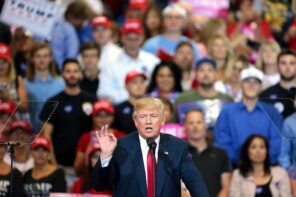“This is what democracy looks like! This is what democracy looks like!” Despite the bitter cold, the solidly frozen ground and black ice, between 100,000 and 350,000 people had assembled on Sunday, the 21st of January, in front of the famous Reichstag building in Berlin, which houses the German parliament (Bundestag). But citizens didn’t just take to the streets in the country’s capital; seemingly everywhere, from Munich and Hamburg, where protests had to be shut down due to massive overcrowding, to small towns like Pirna, where Germany’s far-right “Alternative für Deutschland” (AfD) party has been surging, more than 2 million people have protested against the AfD, most of them calling for a ban of the party as a whole, an action the German constitution permits.
In early January, details of a secret meeting between AfD-members, Identitarians and Neo-Nazis became public, where plans of mass deportations of immigrants—including those of German citizens with an immigrant background—were discussed. Outrage over these plans sent millions into the streets to demand that the government and courts intervene—especially since the AfD’s poll numbers have been rising.
Debates have been raging, both in the US and Germany, over which restrictions, if any, a democratic society can impose on the political participation of those intent on destroying it. Twice in its history, Germany’s Federal Constitutional Court has banned a party, according to historian Dr. Anne-Christin Klotz. In a recent conversation, Klotz, whose research focuses on Jewish history, National Socialism and the Holocaust, told RD:
This option was applied twice in the 1950s: to the Socialist Reich Party, a party that more or less openly acted as a successor organization to the NSDAP [the Nazi Party], and to the Communist Party of Germany (KPD), which belonged to Moscow. Subsequent proceedings against the extreme right-wing parties Freiheitliche Deutsche Arbeiterpartei and Nationale Liste failed because the Federal Constitutional Court came to the conclusion that they were not parties within the meaning of the Basic Law.
The prohibition of the Neo-Nazi Nationaldemokratische Partei Deutschlands (NPD) was attempted twice—the first was discontinued in 2003 on “procedural grounds,” while the second failed in 2017. Speaking with RD, Patrick Heinemann, a lawyer and expert on German constitutional law, reveals the reason—and its relevance to the current situation:
The big problem at the moment is a decision by the Federal Constitutional Court in 2017 not to ban the National Socialist NPD because it lacked the potential to gain power—an unwritten requirement that is not reflected in the wording of [Germany’s] constitution. While the NPD does not in fact pose a threat to our democracy, this judgment has had the fatal effect of convincing many to doubt the success of a ban procedure against the AfD and therefore advise against it.
That same year, in 2017, the AfD entered the Bundestag for the first time. But Klotz stresses that history also reveals why such a high bar must be met in order to ban political parties:
The Basic Law has deliberately placed high hurdles in front of a party ban. This, too, is a lesson learned from National Socialism. It had been made far too easy for [the Nazi Party] to ban the SPD [Social Democratic Party] in 1933 and all other parties shortly afterwards. After fundamental rights had already been restricted by the ‘Reichstag Fire Decree’—which was enacted in accordance with the constitution but bypassed parliament by emergency decree—all that was needed was a decree by Reich Interior Minister Frick declaring the SPD an ‘organization hostile to the people and the state’ and a simple majority in parliament, in which the NSDAP alone had an absolute majority after the SPD was banned.
The possible ban of the AfD isn’t the only constitutional tool to protect democracy being discussed at the moment, explains Heinemann:
There is also currently a debate as to whether the leader of the AfD in Thuringia, Björn Höcke, may have forfeited some fundamental rights, in particular his freedom of expression.
The German constitution allows what it calls a partial “Grundrechteentzug” (“deprivation of fundamental rights”). Demands to remove Höcke from the ballot in the upcoming election, and to ban him from running for office ever again, have been getting louder. Heinemann says:
Such a forfeiture of fundamental rights can only be determined by the Federal Constitutional Court at the request of the Bundestag, the federal government, or a state government. The court can only establish a forfeiture of fundamental rights if the person concerned abuses their fundamental rights in order to fight against the free democratic basic order.
Here, says Heinemann, we are in completely uncharted territory:
The Federal Constitutional Court has not yet ruled that fundamental rights have been forfeited in any case, although a few applications have been made in the history of the Federal Republic of Germany. Such an application could be considered as a milder alternative to a party ban procedure against the AfD because there are concerns that the Federal Constitutional Court might not consider the party as a whole to be unconstitutional.
There are, however, some reasons for cautious optimism. The Office for the Protection of the Constitution (Verfassungsschutz) categorizes the AfD in several states—amongst them Thuringia, Saxony and Saxony-Anhalt—as “definitely right-wing extremist,” and a German court decided in 2019 that it’s legal to call Höcke a fascist. A similar ruling followed in 2023 stating that it is legal to call him a “Nazi,” since this was not an insult but a “value judgment based on facts” that’s covered by freedom of opinion. Both rulings are telling given Germany’s strict libel laws.
Those who argue against defensive measures often claim that it would be fundamentally un-democratic to protect democracy through such restrictions. The “paradox of tolerance,” as philosopher Karl Popper called it, describes the biggest internal conundrum democracies have to solve if they want to be able to defend themselves against enemies in their midst—even if those enemies could feasibly be elected by a majority of the people. It states that in order to remain an open and tolerant society, democracies sometimes have to put limits on their tolerance regarding those who are intent on destroying it.
Debates around this topic are contentious—and rightfully so—since the curtailing of free speech, removal from the ballot, or a ban on running for office should not be tossed around lightly. Yet both in Germany and in the US—albeit with some significant differences—the fascist threat has been growing steadily.
Critics of such measures in both countries claim that the will of the people supersedes everything, even if the result would elevate a candidate to a position of power that would enable them to destroy democratic structures from within—and do so using taxpayer money. However, both the US and the German constitutions have tools to protect themselves and their countries in such instances—by banning candidates who qualify as enemies to the democratic system from the ballot.
In a Substack essay from this past weekend, Yale historian Timothy Snyder, tracks the reason for the existence of self-defense measures in the constitution of the newly founded Federal Republic of Germany to the country’s genocidal past:
One of the principles of West Germany’s postwar constitution—known as the Basic Law—was constitutional self-defense. According to section 1 of article 21, the “internal organization” of political parties “must conform to democratic principles.” According to section 2, parties that “seek to undermine or abolish the free democratic basic order or to endanger the existence of the Federal Republic of Germany shall be unconstitutional.” Section 3 excludes from state financing parties that “are oriented towards an undermining or abolition of the free democratic basic order or an endangerment of the existence of the Federal Republic of Germany.” Judgement as to the constitutionality of political parties is assigned (in section 4) to Germany’s highest court, the Federal Constitutional Court.
Anne-Christin Klotz explains how the Nazis’ rise to power and the Shoah influenced the young Federal Republic after 1945:
Those who had abolished the rule of law and democracy had come to power legally and through democratic processes. A logical conclusion from this was that the laws and constitution of the Weimar Republic had not sufficiently protected democracy and the rule of law. To counter this, a number of protective mechanisms were written into the Basic Law of the Federal Republic. One of these is the possibility of banning political parties.
Too often, it’s assumed that fascists and authoritarians mostly come to power via coup, violently overthrowing the existing political order. Such examples do exist, but they are not the norm. This is why the core argument against keeping Trump, or Höcke, for that matter, off the ballot, doesn’t land. They argue that “voters should decide elections,” as Georgia’s Secretary of State Brad Raffensperger, who was widely lauded for not caving to Trump’s threats to overturn the election in 2020, wrote in a Wall Street Journal commentary several months ago.
Yes, voters decide elections, but if democracies want to persevere, it’s reasonable to stop those who wish to destroy it from being elected. Because, as you’ll recall, fascists typically come to power through democratic elections before using that power to dismantle the democratic system, persecute their political opponents, and crush dissent. Take Germany in 1933: Hitler was elected when the Nazis finally came to power (after his previous violent putsch had failed years earlier).
While the NPD, which was widely recognized as a Neo-Nazi party, was publicly shunned and never gained enough support to seriously threaten the existence of German democracy, the AfD is expected to actually win several of the upcoming elections. And, as Snyder points out, the German Court has been indeed willing to wield the instruments of constitutional self-defense:
On January 23rd of this year, for example, the Federal Constitutional Court denied state financing to an extreme-right party known as Die Heimat, finding that it ‘shows disdain for the free democratic basic order.’
In Germany, the hurdles for banning someone from the ballot, or prohibiting a whole party, are high—but due to the country’s genocidal past and the current surge in right-wing extremism (the AfD is leading the polls in Saxony, Thuringia and Brandenburg), demands to use whatever tools the constitution holds to stop the ascent of fascism have been getting steadily louder.
What’s especially interesting, both in the US and Germany, is how demands for removal of Trump or Höcke from the ballot are being framed in the media—as opposed to how other concerns, especially those regarding immigration have been presented.
In 2014, when the racist anti-immigration group “Pegida” was founded and took to the streets to protest the country’s acceptance of refugees, politicians of various parties called them “concerned citizens” whose fears had to be taken seriously—leading to a long stream of talk shows that both trivialized and mainstreamed those right-wing talking points. Politicians and some media organizations spoke again of “concerned citizens” when people took to the streets to protest against measures to combat the Covid-19 pandemic, side by side with Neo-Nazis.
And yet, strangely enough, when it comes to the current mass demonstrations—which have already surpassed those of Pegida and the anti-Covid measures crowds in size in their first week—neither media outlets nor those who called the latter two “concerned citizens” have been framing the current protests in this way. Which begs the question: Whose “concerns” and whose fears, in their mind, count?
And while some CDU/CSU politicians—such as NRW premier Hendrik Wüst of the conservative CDU—have taken a clear stance against the AfD (“The AfD is a dangerous Nazi party”), other representatives of the conservative spectrum have not, including Bavarian Vice Premier Hubert Aiwanger, who tweeted:
The demonstrations against the right are often infiltrated by left-wing extremists. The farmers’ demonstrations have been falsely accused of infiltration. I expect all democrats and the federal government to distance themselves from left-wing extremists. For politics of the center!
There is, of course, no evidence of such alleged systematic “infiltration.”
In the US, attempts to remove Trump from the ballot have been decried by some as anti-democratic, claiming that doing so would deprive the voters of their choice—omitting that when voters last made their choice, against Trump, in 2020—he refused to accept it, refused to participate in the peaceful transfer of power, and waged a violent coup, with his supporters trying to hunt down and kill members of Congress, and hang his own Vice president.
In the end, the survival of liberal democracies might in no small part depend on the willingness of their courts and other authorities to use the defense mechanisms their constitutions provide against those who are intent on destroying them.





